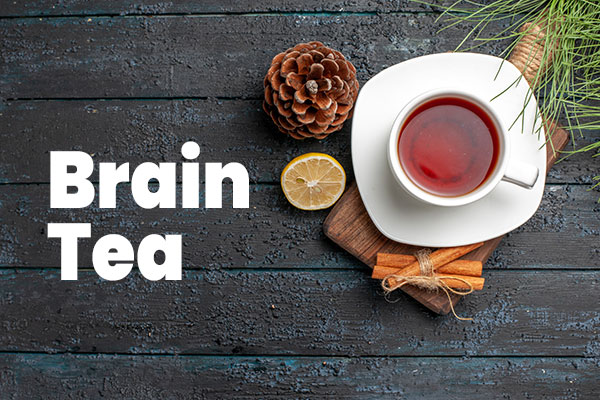Brain Tea
Brain tea, often referred to as cognitive-enhancing or brain-boosting tea, typically contains ingredients that are believed to support cognitive function and mental clarity. While individual formulations may vary, here are some potential benefits associated with brain tea:
Improved focus and concentration:
Certain ingredients like green tea, ginkgo biloba, and ginseng have been associated with enhanced focus and concentration, helping you stay alert and attentive.
Enhanced memory:
Ingredients such as ginkgo biloba and gotu kola have been traditionally used to support memory function and may help with retaining and recalling information.
Reduced mental fatigue:
Some herbs like rhodiola rosea and holy basil are believed to have adaptogenic properties, which means they may help the body adapt to and cope with stress, potentially reducing mental fatigue and promoting resilience.
Increased mental clarity:
Brain teas often contain herbs like rosemary, peppermint, and sage, which are believed to have clarifying effects on the mind, promoting mental clarity and sharpness.
Antioxidant properties:
Many brain teas include ingredients rich in antioxidants, such as green tea and turmeric. Antioxidants help protect brain cells from damage caused by free radicals, potentially reducing the risk of cognitive decline.
Stress reduction:
Ingredients like chamomile and passionflower are known for their calming properties, which can help reduce stress and anxiety, promoting a more relaxed state of mind conducive to mental clarity.
Improved mood:
Some brain teas contain herbs like St. John’s Wort, which is believed to have mood-enhancing properties and may help alleviate symptoms of mild depression and anxiety.
Promotion of neuroplasticity:
Certain compounds found in brain teas, such as flavonoids and polyphenols, have been studied for their potential to support neuroplasticity, the brain’s ability to form new connections and adapt to changes.
Natural and low-calorie:
Brain teas are typically made from natural ingredients and are often low in calories, making them a healthier alternative to sugary or caffeinated beverages when you need a mental boost.
It’s important to note that while brain teas may offer these potential benefits, individual responses can vary, and scientific evidence supporting their efficacy may be limited. Additionally, if you have any underlying health conditions or are taking medications, it’s advisable to consult with a healthcare professional before incorporating brain teas into your routine.
Brain Tea Recipe
Ingredients
- A cup of strong brewed tea (ideally brewed from loose leaf tea to avoid plastics, dyes, and glues used in various tea bags)
- 1 teaspoon each grass fed butter and coconut oil
Blend them together for 15 seconds, and drink!
Why?
Various studies suggest that polyphenolic compounds present in green and black tea are associated with beneficial effects in prevention of cardiovascular diseases, particularly of atherosclerosis and coronary heart disease. In addition, anti-aging, antidiabetic and many other health beneficial effects associated with tea drinking.
Coconut oil’s medium-length chains are easily absorbed and go straight to the liver where, unlike other fats, they’re quickly metabolized (i.e. converted) into energy as special molecules called “ketones.” Ketones can be a great brain fuel, and have been shown in some studies to help with several brain disorders.
Grass fed butter contains Arachidonic Acid which plays a role in brain function and is a vital component of cell membranes. It also has an Anti-stiffness factor that prevents hardening of the arteries, cataracts, and calcification of the pineal gland in the brain.
